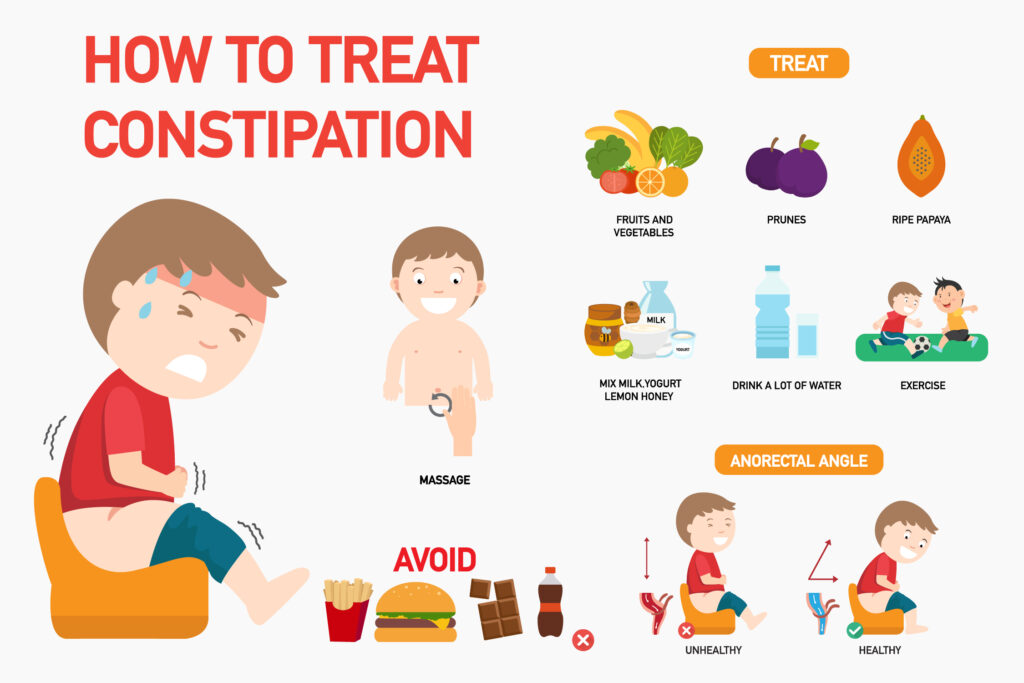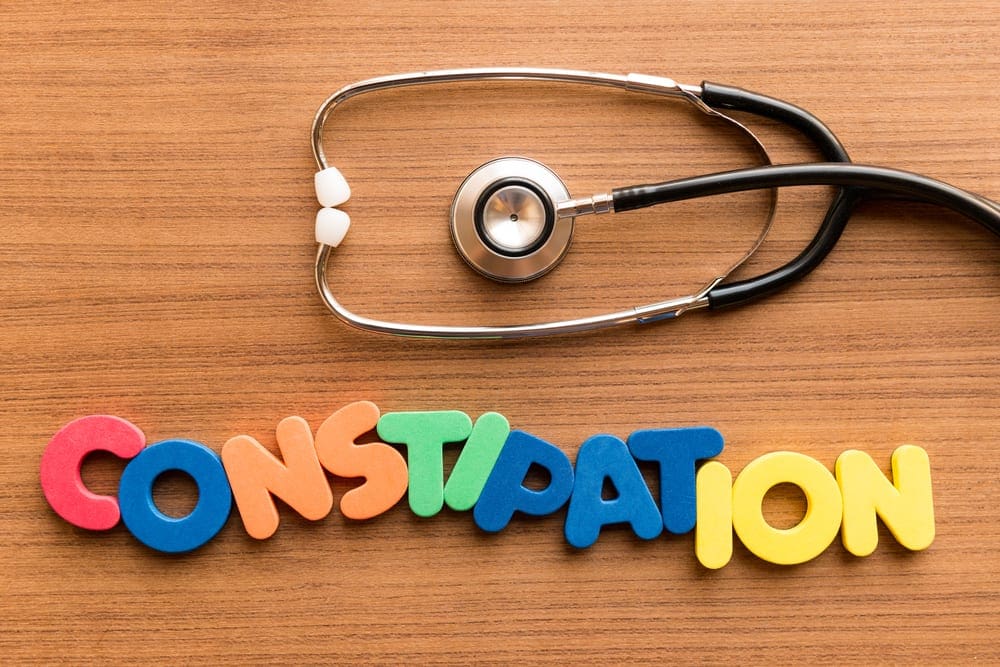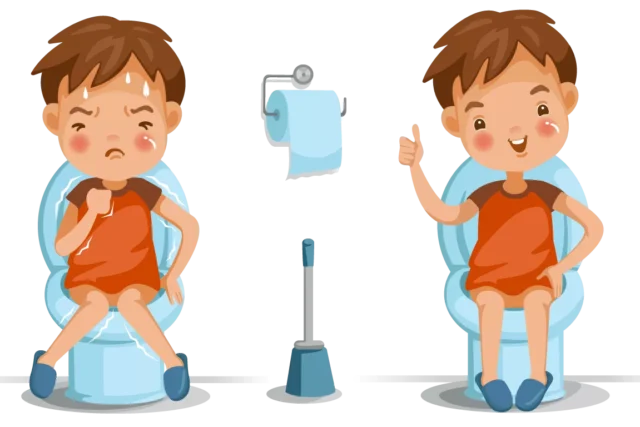Constipation is a common but uncomfortable condition that affects people of all ages. It can be a temporary inconvenience or a chronic issue that significantly impacts one’s quality of life. In this comprehensive guide, we’ll explore effective strategies for overcoming constipation, ensuring your digestive system runs smoothly.
Understanding Constipation
Constipation occurs when bowel movements become less frequent or stools become difficult to pass. It often results from changes in diet, routine, or insufficient fiber intake. Recognizing the symptoms and understanding the causes is the first step toward relief.
Table of Contents
Dietary Changes
High-Fiber Foods
A high-fiber diet is paramount for promoting regular bowel movements. Fiber, found in plant-based foods, adds bulk to the stool and helps it pass more quickly and easily through the intestines. Incorporating a variety of high-fiber foods into your meals can significantly improve digestive health.
Fruits and Vegetables
Fresh fruits and vegetables are rich sources of fiber. Options like berries, apples (with the skin on), oranges, pears, broccoli, carrots, and leafy greens not only add fiber but also essential nutrients and hydration to your diet.
Whole Grains
Replacing refined grains with whole grains can dramatically increase your fiber intake. Whole grains like oats, barley, quinoa, and whole wheat products contain the entire grain kernel, providing more fiber and nutrients than their refined counterparts.
Legumes
Beans, lentils, and chickpeas are excellent sources of fiber. They can be added to salads, soups, and stews, making meals more filling and nutritious.
Importance of Hydration
Alongside fiber, adequate hydration is critical in preventing and treating constipation. Fluids help dissolve soluble fiber, creating a gel-like substance that softens the stool and enhances its passage through the digestive tract.
Water
Drinking plenty of water is the simplest way to stay hydrated. Aim for at least eight 8-ounce glasses of water daily, though your needs may vary based on activity level, climate, and overall health.
Other Fluids
While water should be your primary source of hydration, other fluids like herbal teas and clear broths can also contribute to your daily intake. However, it’s best to limit beverages with caffeine and alcohol, as they can lead to dehydration.
Probiotics
Probiotics, the beneficial bacteria found in certain foods and supplements, can improve gut health and regularity. They enhance digestion and the balance of intestinal flora, which can be beneficial for those suffering from constipation.
Sources of Probiotics
Yogurt, kefir, sauerkraut, kimchi, and miso are excellent sources of probiotics. Incorporating these fermented foods into your diet can aid in maintaining a healthy digestive system.
Mindful Eating
Eating slowly and chewing food thoroughly can also aid digestion and prevent constipation. It ensures that foods are properly broken down and absorbed, reducing the likelihood of digestive discomfort.

Importance of Fiber
Types of Fiber
Fiber comes in two primary forms, each with its own health benefits:
- Soluble Fiber: This type of fiber dissolves in water to form a gel-like material. It can help lower blood cholesterol and glucose levels. Soluble fiber is found in oats, peas, beans, apples, citrus fruits, carrots, barley, and psyllium.
- Insoluble Fiber: This type of fiber promotes the movement of material through your digestive system and increases stool bulk, beneficial for those who struggle with constipation or irregular stools. Whole-wheat flour, wheat bran, nuts, beans, and vegetables, such as cauliflower, green beans, and potatoes, are good sources of insoluble fiber.
Recommended Fiber Intake
The amount of fiber needed depends on age and sex. Women under 50 should aim for 21 to 25 grams of fiber per day, while men under 50 need 30 to 38 grams. For men and women over 50, the recommended intake is 21 and 30 daily grams, respectively, due to decreased food consumption.
Incorporating More Fiber into Your Diet
Adding fiber to your diet can be easy and delicious. Start by choosing whole fruits over juice, swap white rice, bread, and pasta for whole-grain versions, and add beans or lentils to salads, soups, and stews. Remember to increase fiber in your diet gradually to avoid digestive discomfort and to drink plenty of water, which helps fiber do its job.
Benefits of Fiber
Promotes Digestive Health
One of the most well-known benefits of fiber is its ability to prevent and relieve constipation. It does this by bulking up the stool and making it easier to pass, which can help to prevent the stool from becoming hard and difficult to pass.
Aids in Weight Management
Fiber-rich foods are more filling than their low-fiber counterparts, helping you feel full longer. This can reduce calorie intake and aid in weight management.
Lowers Cholesterol Levels
Soluble fiber has been shown to lower total blood cholesterol levels by lowering low-density lipoprotein, or “bad,” cholesterol levels. Diets high in fiber can reduce the risk of heart disease.
Helps Control Blood Sugar Levels
Fiber, particularly soluble fiber, can slow the absorption of sugar and help improve blood sugar levels. This is especially important for people with diabetes.
Enhances Gut Health
Fiber acts as a prebiotic, feeding the good bacteria in the colon. A healthy microbiota is essential for gut health and can impact everything from your immune system to your mood.

Routine and Timing
The Power of Routine
Humans are creatures of habit, and our digestive systems appreciate regularity. Establishing a consistent daily routine helps regulate bodily functions, including digestion. When your body becomes accustomed to a regular schedule, it can more efficiently process and eliminate waste.
Establishing a Bathroom Routine
One of the most effective ways to combat constipation is to develop a regular bathroom routine. Here’s how:
- Listen to Your Body: The first step in establishing a bathroom routine is to heed nature’s call. Ignoring the urge to have a bowel movement can lead to constipation.
- Set Aside Time for Bowel Movements: Try to use the bathroom at the same time each day, ideally in the morning when your body’s natural rhythms are more conducive to bowel movements. The body often signals the need to eliminate a short while after eating, so scheduling bathroom time after breakfast can be particularly effective.
The Role of Timing in Meals
Just as a bathroom routine is crucial, so is the timing of your meals. Eating your meals and snacks at the same times every day can help regulate your digestive system.
- Regular Meal Times: Try to eat at roughly the same times every day. This regularity helps set your body’s internal clock and can improve digestive function.
- Mindful Eating Practices: Slow down and be mindful of each bite during meals. Eating too quickly can lead to swallowing air, which can contribute to gas and bloating, exacerbating constipation.
Exercise and Activity Levels
Incorporating regular exercise into your daily routine can also help alleviate constipation. Physical activity stimulates the muscles in the intestines, helping to move stools through more quickly.
- Find a Consistent Time for Exercise: Whether it’s a morning jog, a midday walk, or an evening yoga session, finding a consistent time for physical activity can enhance regularity and reduce constipation.
Sleep Patterns
Adequate sleep is essential for overall health and can affect digestive health. Irregular sleep patterns can disrupt the body’s natural rhythms, including those that govern digestion.
- Establish a Regular Sleep Schedule: Going to bed and waking up at the same time every day can help regulate bodily functions and aid in digestion.
Hydration
Staying hydrated is crucial for preventing constipation, and timing your fluid intake can also play a role.
- Consistent Water Intake: Ensure you’re drinking enough water throughout the day. Starting your morning with a glass of water can stimulate your digestive system.

When to See a Doctor
Persistent Constipation
If you’ve tried home remedies, dietary adjustments, and lifestyle changes for a few weeks without any improvement, it’s time to see a doctor. Persistent constipation could indicate an underlying medical condition that requires diagnosis and treatment.
Pain and Discomfort
Experiencing significant pain or discomfort during bowel movements is not normal. If bowel movements are consistently painful, or if you feel severe abdominal pain, it’s important to consult a healthcare professional to rule out conditions like anal fissures, hemorrhoids, or more serious gastrointestinal issues.
Blood in Stool
Finding blood in your stool or on toilet paper after a bowel movement is a sign that something might be wrong. While it can be caused by hemorrhoids or anal fissures, it’s crucial to get it checked to rule out more serious conditions like inflammatory bowel disease or colorectal cancer.
Changes in Bowel Habits
Sudden changes in bowel habits, such as going from regular bowel movements to chronic constipation, warrant a doctor’s visit. Especially if these changes are accompanied by unintended weight loss, it’s important to seek medical advice as soon as possible.
Accompanying Symptoms
If constipation is accompanied by symptoms such as vomiting, fever, an inability to pass gas, or severe abdominal bloating, these could indicate a more serious condition like a bowel obstruction, which requires immediate medical attention.
Dependence on Laxatives
Relying on over-the-counter laxatives to have a bowel movement can lead to dependency and could mask underlying issues. If you find yourself needing to use laxatives regularly, discuss this with your doctor to find a more sustainable solution.
Family History
If you have a family history of gastrointestinal diseases, such as colorectal cancer or inflammatory bowel disease, and you’re experiencing constipation, it’s prudent to see a doctor. Early detection and treatment of these conditions can significantly improve outcomes.

Importance of Regular Check-ups
Early Detection of Health Issues
One of the primary benefits of regular check-ups is the early detection of diseases or health conditions. Many conditions, including those affecting the digestive system, can develop silently and without noticeable symptoms in their early stages. Regular screenings and physical exams allow healthcare providers to detect issues like colon polyps, which may develop into colon cancer if left unchecked, or identify risk factors for conditions like irritable bowel syndrome (IBS) and other forms of gastrointestinal distress.
Tailored Health Advice
During a check-up, healthcare professionals can offer personalized advice based on your health history, lifestyle, and risk factors. This might include dietary recommendations to improve bowel regularity, suggestions for physical activity to enhance gut motility, or strategies for stress management to address issues like stress-induced constipation.
Updating Health Information
Your health status and medical needs can change over time. Regular check-ups provide an opportunity to update your health information, review and adjust medications, and discuss any new symptoms or health concerns. This ongoing dialogue with your healthcare provider ensures that your health management strategies remain effective and relevant to your current needs.
Preventative Care
Preventative care is a proactive approach to healthcare, aiming to prevent diseases before they start. For digestive health, this could mean regular screenings for colorectal cancer starting at the recommended age or earlier if you have a family history of the disease. It also includes vaccinations, managing risk factors for heart disease and diabetes, which can indirectly impact digestive health, and discussing lifestyle changes to improve overall well-being.
Building a Relationship with Your Healthcare Provider
Regular check-ups help build a strong, trusting relationship with your healthcare provider. This familiarity can make it easier to discuss sensitive issues, including bowel habits and digestive health. A strong patient-provider relationship improves the quality of care you receive and enhances communication, making it more likely that you’ll follow through with recommendations and treatments.
Peace of Mind
Knowing that you’re taking proactive steps to manage your health can provide significant peace of mind. Regular check-ups can reassure you that you’re doing everything you can to stay healthy or, if issues are found, that you’re addressing them promptly with professional support.
Conclusion
Constipation is a common issue, but with the right strategies, it’s often manageable. By making informed choices about diet, exercise, and routine, you can promote a healthier digestive system and improve your overall well-being.
FAQs
- How much fiber should I aim for each day? Aim for 25-30 grams of fiber daily from a variety of sources.
- Can exercise really help with constipation? Yes, regular exercise helps stimulate digestion and can reduce the time food stays in the colon.
- Are over-the-counter laxatives safe? They can be when used as directed, but they’re not intended for long-term use.
- How can I tell if my constipation is serious? If you experience persistent pain, blood in your stool, or constipation that doesn’t improve with lifestyle changes, see a doctor.
- Can stress cause constipation? Yes, stress can impact digestive function and contribute to constipation.



MOST COMMENTED
Animal-Based Proteins / Casein Protein / Dietary Protein / High-Protein Diets / Pea Protein / Plant-Based Proteins / Protein / Protein Deficiency / Protein Supplements / Proteins / Whey Protein / Whey Proteins
Is Protein Powder Safe for Teenagers and Children?
Animal-Based Proteins / Casein Protein / Dietary Protein / High-Protein Diets / Pea Protein / Plant-Based Proteins / Protein / Protein Deficiency / Protein Supplements / Proteins / Whey Protein / Whey Proteins
Unlock the Power of Proteins for Optimal Gut Health
Animal-Based Proteins / Casein Protein / Dietary Protein / High-Protein Diets / Pea Protein / Plant-Based Proteins / Protein / Protein Deficiency / Protein Supplements / Proteins / Whey Protein / Whey Proteins
Pea Proteins: The Best Plant-Based Protein Alternative?
Multivitamin
Total Health: Multivitamin for Active Lifestyles
Multivitamin
WellnessFusion: Complete Multivitamin Support
Dietary Supplement
Revitalize Your Health: The Magic of Red Yeast Rice Capsules
Foot care / Foot Health
Revitalize Your Foot Care Routine: Essential Tips for Optimal Foot Health
Foot Problem / Diabetics / Foot Health
Diabetics: Mastering Footwear Selection for Enhanced Foot Health and Ultimate Comfort
Exercises and Footwear Tips for Hammertoe Relief / Foot care / Foot Health / Foot Pain / Foot Problem / Hammertoes
Unlock Effective Exercises and Footwear Tips for Hammertoe Relief
Hammertoes / Foot Health / Foot Pain / Foot Problem
Unlock Relief: Essential Guide to Hammertoes Causes, Symptoms, and Treatments